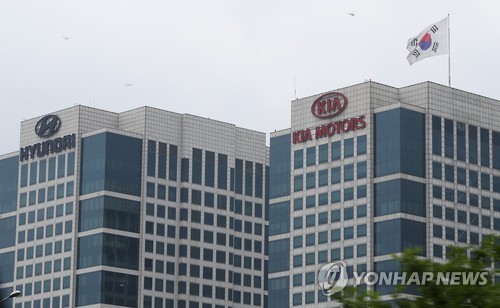Hyundai Motor and Kia Motors, South Korea’s top two automakers, attended on Monday a hearing on a forced recall, following the first-ever refusal by a local automotive company to comply with recalls ordered by the government.
The Ministry of Land, Infrastructure and Transportation had ordered Hyundai and Kia to recall 250,000 vehicles across 12 models last month, after looking through five cases of possible safety risks caused by allegedly faulty auto parts.
While acknowledging the defective parts installed in its cars, Hyundai Motor Group continues to argue they do not pose threats to passenger safety.
“We believe that whether the reviewed faulty parts are directly linked to safety has to be looked over again. As for now we cannot accept the ministry’s findings,” said the spokesperson of Hyundai Motor Group.
 |
Hyundai Motor Group headquarters in Southern Seoul. (Yonhap) |
According to the ministry, the recalls were ordered based on two technical investigations by the Korea Transportation Safety Authority, which showed the faulty parts may pose risks to safety, such as the possibility that the tires may come loose and the cars may suddenly stop while driving.
“Hyundai and Kia Motors’ decision to go against the ministry’s order is risky. The Ministry of Land, Infrastructure and Transportation is very conservative, so when it orders a recall it does so on concrete evidence and reason,” said Kim Pil-soo, a professor of automotive engineering at Daelim University.
The recall order came after a whistleblower claimed the company allegedly covered up defects last year.
“The automotive companies may be taking such a strong stance in defense against the remaining claims made by the whistleblower,” Kim said.
The ministry has said that the recall decision pertains to: a malfunctioning canister installed in Hyundai Motor’s luxury Gensis and Equus sedans; a loose hub nut installed in Kia Motors’ Mohave SUV; a damaged vacuum pipe of three models including the best-selling Avante compact sedan; a broken fuel hose of the R-engine found in five models including the Sorento SUV; and a defective parking brake of the luxury Genesis sedan, LF Sonata sedan and the Sonata Hybrid.
Professor Lee Byung-kwan of Kwang Woon University’s Department of Industrial Psychology advised a cautious approach by the automakers, citing public sentiment toward recall orders.
“Consumers believe that the recalls were ordered for safety reasons. So refusing the order can lead to negative sentiment toward the automakers,” beyond confirmation of facts.
The closed-door hearing was held at the ministry’s office in Sejong on Monday from 2 p.m. in the presence of outside specialists, 10 officials from the ministry and the Korea Transportation Safety Authority, along with up to seven Hyundai and Kia officials.
Before a final announcement is made, specialists who led the hearing will send a report to Hyundai and Kia Motors containing their stance for confirmation, which will be submitted to the ministry.
The ministry will make the final call after reviewing the report and specialists’ opinion.
“It will take some time before a final decision is made, but we will try to conclude the case as soon as possible,” said the ministry spokesperson.
By Kim Bo-gyung(
lisakim425@heraldcorp.com)







![[From the Scene] At this Starbucks, you need ID: Franchise opens store with view of North Korea](http://res.heraldm.com/phpwas/restmb_idxmake.php?idx=644&simg=/content/image/2024/11/29/20241129050068_0.jpg)
